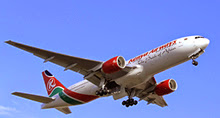AfCFTA: The Post Covid-19 stimulus in Africa
 |
| Kenya Airways: Retooling |
Among the areas that need urgent attention is, pharmaceutical production, where Africa is especially vulnerable, adds the Africa Trade Policy Centre. It should also prioritize intra-Africa trade.
The pandemic shocked the entire world because it was “sudden, extreme, and spread rapidly,” says Daniel Susskind of Oxford University. Policy measures to contain it disrupted the entire economic spectrum of production, supply and demand resulting in the “self-inflicted economic devastation.”
Such devastation also taught some critical lessons and exposed glaring risks. Among these are the vulnerabilities in the current world economic, financial, and Political system.
These
vulnerabilities must be addressed to shield Africa, from future
shocks. In fact, the containment measures exposed the risks inherent in
globalization. These include; our obsession with efficiency, nationalism,
short-termism, and capture,” says Professor Ian Golding of Oxford University.
In Africa, depending
on other countries for critical inputs to the local manufacturing sector is a
major risk. This is glaring in the dependency
on China and India, for Active Pharmaceutical Ingredients, APIs, used in the
manufacture of medicines.
When the source countries locked down, coupled with export bans elsewhere, there were shortages of critically needed medicine to fight COVID-19 in Africa which, imports 92 percent of its medicines, according to the APTC report. The continent argued the report, has only three plants that manufacture APIs, and even then, they are weak and cannot meet the continental demand.
Consequently, the
report calls for Prioritization of localizing the pharmaceutical value chain in
Africa among other measures needed to ensure public health security. This includes supporting the three API manufacturers.
The lockdowns also
negatively affected the markets for Africa’s commodity exports and trade within
the continent due to logistical problems. Landlocked countries were especially
hit due to containment measures that resulted in long queues as trucks' movement
were restricted due to testing for the virus.
It thus exposed the risk of depending on ground transport to deliver freight. Dependency on trucks for the long- haul of freight for export and imports, given Africa’s inadequate transport infrastructure, is risky and a security threat.
Therefore, Africa
must exploit air transport to overcome infrastructure hurdles while containing
the Pandemic. Epidemiologists say that the pandemic will be with us for quite a
while and that we must learn to live “in the new normal” of restricted
movements and physical distancing. This calls for review business practices
and policies. If we stick to the old way
of doing things, warn experts, economic recovery will be a mirage.
Given the Pandemic’s
economic devastation, worldwide, rapid recovery at the other side of Covid-19
will need a marshal plan. In Africa, fiscal restraints dictate against such a plan.
However, Africa can and must, overcome these hurdles with policy actions that become
stimulus packages.
Among these is turning to air transport which is faster, safer, and relatively cheaper if we factor in the duration freight takes by road to reach its destination. Apart from easing trade barriers caused by land transport, freight transport by air is a lifeline for African airlines facing the threat of collapse.
According to
International Air Transport Association, IATA, there are 349 commercial Airports
in Africa, giving an average of six Airports for each country. https://www.icao.int/
According to IATA, there are 161 airlines in Africa with a frequency of 1.13 million flights a year to transport 98 million passengers. This means that, on average, each of the 161 airlines ships an average of 609,000 passengers per year. This low payload could suffer further declines owing to the growing dependence on “Zooming,” further endangering African airlines.
The airlines should therefore retool themselves
into freight carriers rather than passenger carriers. It is heartening that some airlines, such as Kenya Airways, are s retooling their aircraft into freight carriers.
In 2018, Africa liberalized Air transport by launching the Single Africa Air Transport Market, SAATM. This enables an “eligible” aircraft or airliner from one African country can fly over another African country’s airspace and land on its territory by using a simple prior notification procedure, says IATA. The only, hurdle to the exploitation of this opportunity is the customs tariffs.
According to IATA,
the liberalized Airspace creates opportunities for African Airlines to increase
frequencies and traffic in the continent. Air transport is an enabler, meaning
its growth will draw other sectors that depend on it along with it as it raises
the efficiency of delivery leading to improved economic efficiency and lower
costs.
Air transport also
fits well with the “new Norm” where physical distancing is a tool for
managing the Covid-19 pandemic: It is heavily mechanized and, by its very nature,
restricted to the operation hubs. It is a proper fit for increasing
intra-Africa trade. There are fears though, that the powerful truck owners lobby could resist this paradigm shift.
African is famous for exploiting new technologies to solve major problems. It exploited the cellular technology to overcome the communications gap. It is exploiting wind, Solar, and Geothermal technologies to increase electrification. It can exploit air transport to eliminate logistical hurdles to trade. In fact, unlike, telecommunications and Energy, the infrastructure for air transport is in place. What is not in place is policy actions to exploit the hanging fruit.



Comments
Post a Comment